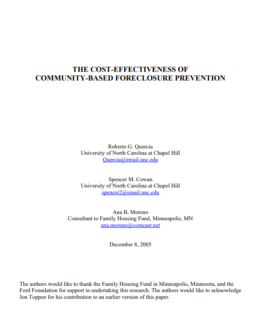The Cost Effectiveness of Community-Based Foreclosure Prevention
Programs supporting homeownership for low-income families need to be linked to the full continuum of homeownership support services: pre-purchase education and counseling, financial assistance, post-purchase support, and foreclosure prevention.
This study explores the cost-effectiveness of community-based foreclosure prevention interventions. It evaluates two measures: the time it takes to resolve a homeowner’s mortgage default and the tendency of some homeowners to miss mortgage payments again after having cured a mortgage default. Family Housing Fund commissioned the study with the intention of shedding insight on the Mortgage Foreclosure Prevention Program (MFP Program) operating in Minneapolis and Saint Paul, which provides counseling, advocacy, and resources to homeowners who are behind on mortgage payments or property taxes. This report updated and expanded research that was done in 1995 and 1998, which included accomplishments of the MFP Program as well as national and local strategies for mortgage foreclosure prevention.
Just as in 1995 and 1998, this study found the MFP Program is cost effective by several measures. On average, it took 11 months for participants to resolve their mortgage defaults, and one quarter of the participants who avoided foreclosure through the program reported being behind on payments again 12 months after the program. Pre-purchase counseling was found to be one of the most cost-effective services of a community-based foreclosure prevention program.
How do these results compare to the performance of the MFP Program in the 1990s?
- 1998: Mortgage Foreclosure Prevention: Program and Trends
- 1995: Cost Effectiveness of Mortgage Foreclosure Prevention and its summary
Interested in what Family Housing Fund did to address the foreclosure crisis of the late 2000s? Take a look at our coordinated approach.
